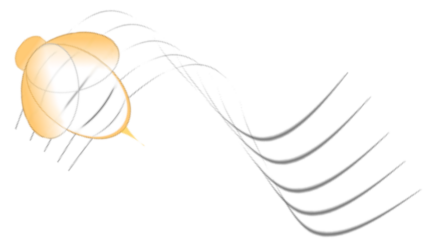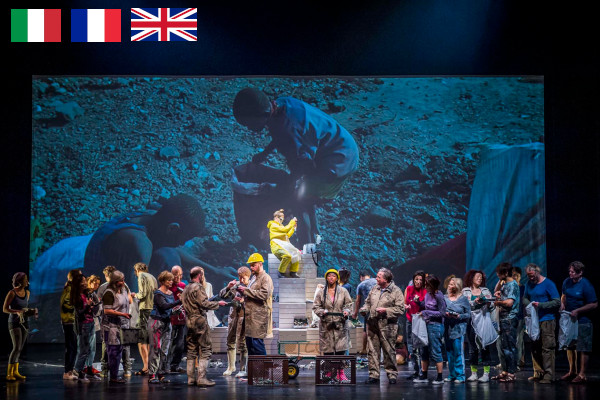L’Européenne, a world première
by Susanne Krekel Daumann
These days, thousands of people are at the European borders, others try to cross the Mediterranean. These days, humanity leaves us wondering once again. Opera is often said to be dead, useless, fossilized. These days, it turns out to be alive and kicking and more necessary than ever.
Lübeck, 6 March 2020 - The second part of a common project of the theaters both of Halle and Lübeck, based on Meyerbeer’s L’Africaine, this Européenne is a dark and somber drama.
It tells the story of Lena, a young European woman come to Africa in order to work for a NGO, and Bouba, her African lover. It is Lena’s job to measure the toxicity of the soil near a dump for electronic devices from Europe. Bouba is a hacker and unlocks the hard drives he can get in order to make money out of the data still hidden in them. For the most part, however, people who work here are barely making a living, risking their lives and their health in the process. Lena has to go back to Europe, and Bouba decides to follow her. In Europe, living together is not easy. Lena has a bipolar disorder and after a quarrel, she tells Bouba to leave. In despair, she swallows a massive dose of pills. When Bouba comes back, they go to bed together, and while he is asleep, she dies. Bouba is accused of murder or at least of accidental homicide. The process is also the theater of neo-nazi demonstrations. The end is open, the choir reminds us in a touching final chorale that everyone is equal in death.
Not only the reference to death, also the presence of the feticheur, the shaman as it were, and the spirits of the ancestors he convokes give a spiritual dimension to the work: in order to find help with his work, and later on to ascertain the success of his voyage to Europe, Bouba will seek out the chaman and the spirit of the Hare and the Hyena. The Hare is in favor of him following his love, the Hyena sees the danger of materialism. Later on, these two characters will be among his judges.
It’s a complex history, about an ever-important subject. Thomas Goerge’s libretto is dense and poetic, almost a kind of collage, it uses so many quotes, we hear words by Trakl, by Rückert - and Bouba and Lena’s lover’s vows are the words of a Beethoven lied. Richard van Schoor’s music is just as complex and full of quotations, where African rhythms meet the European musical language. There are moments where we think of Strauss or Korngold, poignant love duets, there is a magnificent choir, prepared by Jan-Michael Krüger, that imitates animals’ voices, whispers and sings beautiful things. There is a complex instrumentation, lots of percussions, instruments that have been made from recycled material, and there is the traditional orchestra. Andreas Wolf guides the Philharmonic Orchestra of the City of Lübeck with accuracy and attention. Some moments lacking somewhat in drive leave us wondering a bit: is this passage meant to be taken so languorously?
For his stage direction, Lionel Pouitaire Somé uses the simple and effective scenography of Daniel Angermaier and especially video projections. These videos, those that show the life of the dumpster-people and especially those that show lightweight, overcrowded boats in the middle of the ocean, from where people jump into the water - bringing to mind 9/11 images - are as poignant as can be and thankfully van Schoor didn’t weigh them down with heavy string lines, they are shown in near quiet, just a very high string line can be heard. And the public is petrified, impressed.
This is a work that wants to ask questions, confront, wake up. A German librettist, a white South-African composer, an African stage director - in this collaborations cultures confront each other with their prejudices, be it the Africans who imagine Europe a place where milk and honey flow, be it the Europeans who still come to Africa to help, do good, convinced of their own superiority. The libretto and the music play successfully with these ideas, question and superpose them.
South-African tenor Owen Metsileng sings Bouba, tender, lost, sweet - he is credible and sings his part with easy grace. Emma McNairy as Lena is just as convincing. With the hysterical jumps in her sprechgesang, she delivers a moving portrait of this tortured character. Remarkable also Charity Collin in the role of the Hare and Caroline Nkwe’s Hare-Judge.
These days, thousands of people are at the European borders, others try to cross the Mediterranean. These days, humanity leaves us wondering once again. Opera is often said to be dead, useless, fossilized. These days, it turns out to be alive and kicking and more necessary than ever.
Huge thanks to the commanding theatres, and congratulations to the whole team. May this work find its place in the programs of opera houses all over the world!



